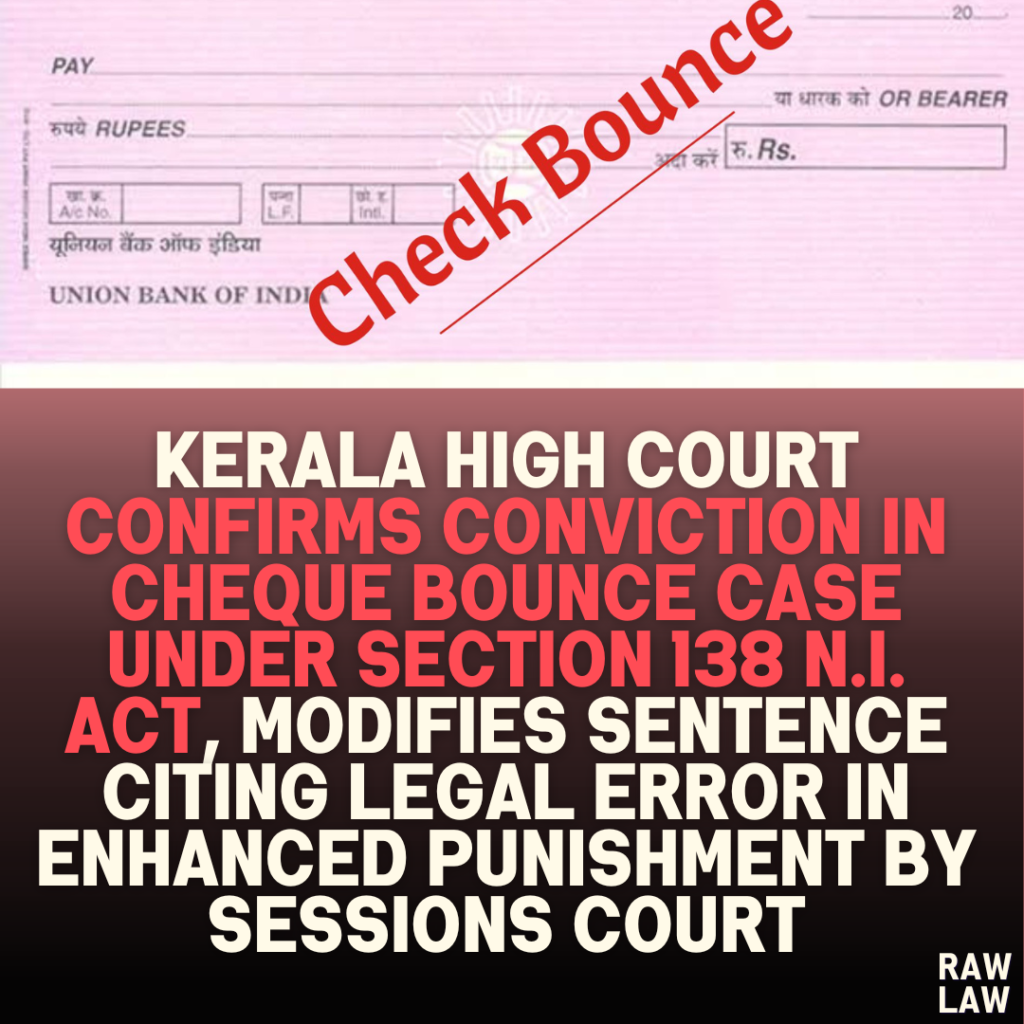Court’s Decision:
The Kerala High Court upheld the conviction of the accused under Section 138 of the Negotiable Instruments Act (N.I. Act) for issuing dishonored cheques. However, the Court modified the sentence imposed by the Sessions Court, which had improperly enhanced the punishment in an appeal filed by the accused. The sentence was adjusted to align with the original order from the Magistrate’s Court, where the accused was directed to pay a fine of ₹2 lakhs and, in default, undergo simple imprisonment for three months.
Facts:
The complainant, a bank, filed a case alleging that the accused issued two cheques, each for ₹91,009, drawn on Federal Bank Ltd. in partial discharge of a loan obligation. Both cheques were dishonored due to insufficient funds. Despite receiving a legal notice, the accused failed to pay the amounts covered by the dishonored cheques, leading to the complaint under Section 138 of the N.I. Act.
The accused denied issuing the cheques in discharge of any liability and claimed they were taken as security during the loan agreement. She contended that the cheques were misused by the bank.
Issues:
The primary issues before the Court were:
- Whether the cheques were issued in discharge of a legally enforceable debt.
- Whether the accused had made part payments before the presentation of the cheques, affecting their validity under Section 138 of the N.I. Act.
- Whether the enhanced punishment awarded by the Sessions Court was valid under the law.
Petitioner’s Arguments:
The petitioner (accused) argued that the cheques were issued as security and not in discharge of any debt or liability. She further submitted that she made partial payments to the loan account before the cheques were presented for collection, which should have been considered by the courts.
Respondent’s Arguments:
The respondent (complainant bank) maintained that the cheques were issued in discharge of the petitioner’s debt and that the dishonor of the cheques and the failure to repay the amount constituted an offense under Section 138 of the N.I. Act.
Analysis of the Law:
The Court referred to Section 118(a) and Section 139 of the N.I. Act, which provide a presumption in favor of the holder of the cheque. These provisions establish that the cheque was issued in discharge of a liability unless proven otherwise. The accused, despite raising defenses, failed to rebut this presumption convincingly.
Precedent Analysis:
The Court referred to the ruling in Dashrathbhai Trikambhai Patel v. Hitesh Mahendrabhai Patel, where it was held that part payments made before the dishonor of a cheque must be endorsed on the cheque under Section 56 of the N.I. Act. However, in the present case, the accused failed to prove that the part payments were made towards the amount covered by the dishonored cheques.
Court’s Reasoning:
The High Court found no reason to interfere with the conviction as the accused had not successfully rebutted the statutory presumption that the cheques were issued in discharge of a debt. The Court also addressed the legal error committed by the Sessions Court, which enhanced the sentence by imposing substantive imprisonment in an appeal filed by the accused. Citing Section 386(b)(iii) of the Code of Criminal Procedure, the Court held that an appellate court is barred from enhancing the sentence in such appeals.
Conclusion:
The Court confirmed the conviction of the accused for the offense under Section 138 of the N.I. Act. However, the sentence was modified to the original order of the Magistrate’s Court, with the accused being sentenced to pay a fine of ₹2 lakhs and, in default, to undergo simple imprisonment for three months.
Implications:
This judgment reinforces the legal presumption under Sections 118(a) and 139 of the N.I. Act, affirming that the burden of disproving a debt lies with the accused in cheque bounce cases. It also clarifies the limitation on appellate courts enhancing sentences in appeals filed by the accused. The ruling upholds the principle that security cheques, if not linked to a valid debt discharge, can still attract punishment under Section 138 if not effectively rebutted.
